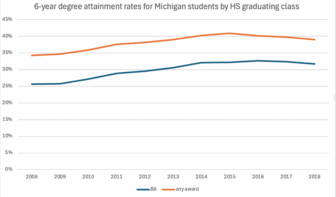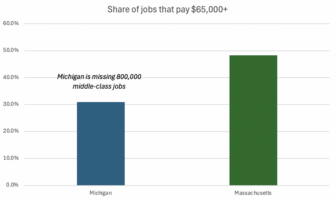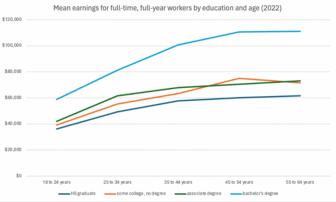The core lesson Michigan Future has learned in more than a quarter of a century of research about ![]() the Michigan and national economy is that the single best predictor of individual and community prosperity is a four-year degree.
the Michigan and national economy is that the single best predictor of individual and community prosperity is a four-year degree.
This, of course, is now not conventional wisdom. We are constantly bombarded by way too many business and political leaders telling us that kids (really other’s kids) are better off forgoing a four-year degree and rather should go into the skilled/professional trades. And at the community level, they tell us, Michigan has too many people with four-year degrees. Neither are accurate.
In this and my next post I want to look at updated data that shows how inaccurate both are today. That the four-year prosperity premium keeps growing.
In this post we will look at data on average hourly wages by education attainment from 2000-2016. The data comes from an analysis by the Economic Policy Institute of Current Population Survey Outgoing Rotation Group microdata.
As you can see in the chart below, annual hourly wages have risen faster for those with at least a four-year degree. The most for those with an advanced degree. The wage premium is growing. There simply is no evidence that getting a four-year degree is less important today to a good-paying job than it was at the turn of the century or since the onset of the Great Recession.
Also striking is the decline in average hourly wages for those with some college. The only cohort that saw a decline from 2000-2016. Some college includes those with an Associates degree, those with a post secondary credential from a higher education institution and those who attended college but have not earned a credential. The steepest growth in average hourly wages is between those with a four-year degree and those with some college.
Here are the average hourly wages by education attainment in 2000, 2007 (the last year before the Great Recession) and 2016:
- For those with an advanced degree average hourly wages, corrected for inflation, in 2016 are $41.01 up from $37.79 in 2000 and $38.47 in 2007
- For those with a bachelors degree average hourly wages, corrected for inflation, in 2016 are $31.93 up from $29.87 in 2000 and $30.57 in 2007
- For those with some college average hourly wages, corrected for inflation, in 2016 are $19.11 down from $19.44 in 2000 and $19.54 in 2007
- For those with a high school degree average hourly wages, corrected for inflation, in 2016 are $17.25 up from $17.11 in 2000 and down from $17.33 in 2007
- For those with less than a high school degree average hourly wages, corrected for inflation, in 2016 are $13.23 up from $12.72 in 2000 and $13.16 in 2007
To be clear, we are not saying that everyone needs a four-year degree. That is not accurate. Or that there are not good-paying jobs, and more importantly forty year careers, that don’t require a four-year degree. That clearly is not accurate either. What we are saying is the most reliable path to good-paying jobs and careers is with a four-year degree or more. And that no kid should be steered away, by any adult, from pursuing a four-year degree. Even better, all kids should have a chance to explore data like this and decide for themselves what path they want to follow when they graduate from high school.







